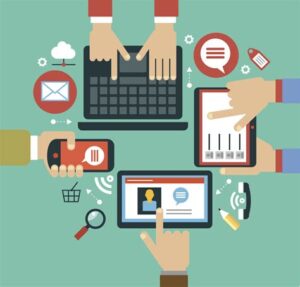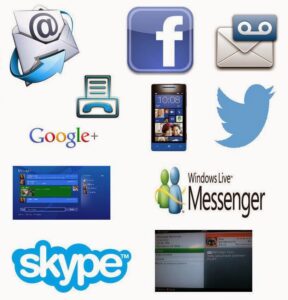Back to: Computer Studies JSS1
Welcome to class!
In today’s class, we shall be talking about the uses of ICT in communications. Please enjoy the class!
ICT Application in everyday life – Uses of ICT in communication

Information and Communication Technology (ICT) has revolutionized the way we communicate in Nigeria and across the globe. From simple text messages to complex video conferencing, ICT has transformed the way we connect, share information, and collaborate. This class will explore the various ways ICT is used in communication.
1. Connecting with Others:

Mobile Phones and Smartphones: These ubiquitous devices have become the primary means of communication for many Nigerians, allowing instant messaging, voice calls, video calls, and social media interaction.
Social Media Platforms: Platforms like Facebook, Twitter, Instagram, and WhatsApp have become vital tools for connecting with friends, family, and colleagues. They allow for group communication, sharing of photos and videos, and staying updated on current events.
Email: Email remains a reliable and formal way to communicate, particularly in academic and professional settings.
2. Accessing Information:

Internet: The internet provides a vast repository of information, allowing students to conduct research, download study materials, and access educational resources.
Online Learning Platforms: Platforms like Coursera, EdX, and Khan Academy offer a wide range of online courses and learning materials, allowing students to supplement their classroom learning and acquire new skills.
E-books and Audiobooks: These digital formats allow students to access books and learning materials conveniently and affordably.
3. Collaboration and Teamwork:
Cloud-based Collaboration Tools: Tools like Google Drive, Dropbox, and Microsoft OneDrive allow people to share documents, work on projects together in real-time, and collaborate remotely.
Video Conferencing Platforms: Platforms like Zoom, Skype, and Microsoft Teams enable organizations to hold virtual meetings, attend online classes, and participate in webinars.
Project Management Tools: Tools like Asana, Trello, and Monday.com help business experts to organize project tasks, track progress, and communicate effectively with team members.
4. Enhancing Learning:
Interactive Learning Apps: Educational apps and games can make learning more engaging and interactive, helping students visualize concepts and retain information.
Learning Management Systems (LMS): Platforms like Afrilearn and classnotes.ng allow teachers to share course materials, provide feedback, and facilitate online discussion forums.
Virtual Reality (VR) and Augmented Reality (AR) Technologies: Emerging technologies like VR and AR have the potential to revolutionize education by creating immersive learning experiences.
In conclusion, ICT has become an integral part of our communication landscape, offering significant benefits for Nigerian college students. Embracing these technologies can enhance learning, collaboration, and access to information. However, addressing the challenges and promoting digital literacy are crucial for ensuring equitable access and productive use of ICT in communication.
We have come to the end of today’s class. I hope you enjoyed the class!
In the next class, we shall be discussing Uses of ICT in timing and control.
In case you require further assistance or have any questions, feel free to ask in the comment section below, and trust us to respond as soon as possible. Cheers!
Question Time:
- How can educational institutions prepare students to be effective communicators in the digital age?
- How has ICT transformed the way you communicate with others?
- What are the most significant advantages and disadvantages of using ICT for communication?
- How can we ensure that ICT is used responsibly and ethically in communication?
- What role can ICT play in promoting digital inclusion and overcoming the digital divide in Nigeria?
